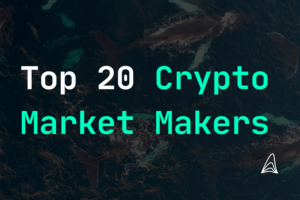
Cryptocurrency Forking: A Guide to Hard and Soft Forks
- Jakob Brezigar
- Last updated: 07.September 2024
- Reading time: 4 min
In the world of cryptocurrencies, forks are like blockchain’s version of sibling rivalry—each one vying for attention and bringing new rules to the dinner table. Just as forks in the road present new paths and adventures, so too do forks in blockchain technology, which involve changes to the blockchain protocol. But what exactly is forking in crypto? Simply put, it’s a modification of the blockchain’s code that results in the creation of a new version, coexisting with the original. Let’s dive deeper into the intriguing world of blockchain forks and discover their significance.

Table of Contents
What is a blockchain fork?
A blockchain fork is a modification of the blockchain’s code, resulting in a new version that can either coexist with the original (soft fork) or replace it (hard fork).
How do hard forks affect cryptocurrencies?
Hard forks create new cryptocurrencies by introducing significant protocol changes. Examples include Bitcoin Cash and Bitcoin Gold, which operate independently from the original blockchain.
Key Takeaways - Cryptocurrency Forking:
Forking is a code modification creating a new blockchain version, either hard or soft.
Hard forks introduce radical changes, often creating new cryptocurrencies like Bitcoin Cash.
Soft forks implement upgrades, maintaining backward compatibility for smoother transitions.
In a unanimous protocol, a single blockchain contains verified data that the network asserts to be correct. However, forks can lead to multiple valid chains.
Market makers like Orcabay use forks to enhance market efficiency and liquidity.
Forks drive blockchain evolution, enabling innovation and adaptability within the crypto ecosystem.
What is a Fork in Blockchain?
A fork in blockchain is an open-source code modification that results in the creation of a new version of the blockchain, coexisting with the original. This modification can range from minor tweaks to significant changes. Nodes on the network must follow the same protocol, which includes rules such as block size and miner rewards. In decentralized networks, consensus among nodes is essential to maintain the shared state of the blockchain.
Blockchain forks occur when developers or miners modify the blockchain protocol, creating a new path that can diverge from the original. This process is akin to updating software, where some nodes continue running the older version while others adopt the new protocol. These changes are necessary for implementing new features, enhancing security, or addressing issues within the blockchain.
Types of Forks
Hard Fork
A hard fork represents a radical change to the blockchain protocol, making it incompatible with previous versions. Nodes that do not upgrade to the latest version cannot process transactions or add new blocks to the post-fork blockchain. This type of fork necessitates that all nodes and miners upgrade to the new protocol to remain part of the updated blockchain network.
Examples of hard forks include the creation of Bitcoin Cash and Bitcoin Gold. These forks were initiated to address specific limitations and introduce new features, resulting in entirely new cryptocurrencies that operate independently of the original Bitcoin blockchain.

Soft Fork
A soft fork, on the other hand, is a blockchain protocol change that maintains backward compatibility. This means non-updated nodes can still process transactions and add new blocks to the blockchain, albeit under the new protocol rules. Soft forks typically require only a majority of miners to upgrade, unlike hard forks which necessitate almost all nodes to update.
Soft forks are often used to implement new features or fix security issues within a blockchain. They allow for gradual adoption of changes without disrupting the network’s overall functionality, making them a more flexible option for blockchain upgrades.

Crypto Market Makers Point of View on Forking
At Orcabay, we generally support soft forks over hard forks in the crypto space. The key difference between Bitcoin and Ethereum lies in how they handle protocol upgrades. Bitcoin mainly uses soft forks, which are backward-compatible and come with lower security risks. Hard forks, like the Bitcoin Cash split during the blocksize wars, often lead to community division. On the other hand, Ethereum frequently implements hard forks, which aren’t backward-compatible and carry higher risks. However, because of Ethereum’s complex protocol, these hard forks allow for faster innovation by introducing new features and updates.
Causes of Forks
Forks can occur both intentionally and unintentionally within blockchain networks. Intentional forks happen when developers or miners deliberately create a new blockchain with different rules. These forks are often used to introduce new features, reverse the effects of hacks, or address fundamental disagreements within the community.
Unintentional forks, however, arise when two or more miners find a block at nearly the same time, temporarily disrupting the single blockchain until consensus is reached. In such cases, the network temporarily splits until consensus is reached, and the longest chain is adopted. The blocks not included in the longest chain are abandoned, ensuring the blockchain remains unified.

How Forks Work
A fork occurs when a blockchain protocol change splits the blockchain into two competing paths. The new blockchain retains the same history as the original up to the point of the split. This shared history ensures that both blockchains have a common origin, providing continuity for users and transactions.
Forks can result in the creation of new cryptocurrencies, which may compete with the original blockchain. These new cryptocurrencies offer different features and functionalities, providing users with more options within the crypto ecosystem. However, the value and success of these new cryptocurrencies are not guaranteed, and they may not achieve widespread adoption.

The Impact of Forks in Crypto
Hard forks can create new tokens, but their value is not guaranteed. Investors should be cautious, as many hard forks may eventually become worthless. Blockchains resulting from hard forks operate independently, meaning what happens on one does not affect the other.
Crypto investors should limit their purchases to amounts they are comfortable losing, as cryptocurrencies are not insured by institutions like the FDIC or SIPC. This risk factor underscores the importance of understanding the implications of forks and making informed investment decisions.
The Role of Forks in Blockchain Evolution
Forks play a crucial role in the evolution of blockchain technology by enabling fundamental changes to the blockchain protocol. They allow for the implementation of fundamental changes or the creation of new assets with characteristics similar to the original blockchain. By facilitating innovation and adaptation, forks ensure that blockchain projects can evolve and meet changing needs and challenges.
Decentralized networks rely on nodes to reach consensus on the shared state of the blockchain. Forks enable these networks to adapt and improve, fostering a dynamic and resilient ecosystem. As the blockchain landscape continues to evolve, forks will remain a vital mechanism for driving progress and addressing emerging issues.

Final Thoughts on Forking in Crypto
Forks are a natural part of the blockchain ecosystem, enabling innovation and improvement. Understanding the different types of forks and their implications is essential for crypto investors and enthusiasts.
In conclusion, cryptocurrency forking is a complex but essential aspect of blockchain technology. Whether through hard forks or soft forks, these mechanisms allow for the continuous evolution and adaptation of blockchain networks, ensuring their relevance and functionality in an ever-changing digital landscape. As the technology progresses, staying informed about the nature and impact of forks will be crucial for navigating the crypto world effectively.
Disclaimer: The information provided in this article is for informational purposes only and does not constitute financial, investment, or other professional advice. All opinions expressed herein are solely those of the author and do not represent the views or opinions of any entity with which the author may be associated. Investing in financial markets involves risk, including the potential loss of principal. Readers should perform their own research and consult with a licensed financial advisor before making any investment decisions. Past performance is not indicative of future results.

Jakob Brezigar
Jakob, an experienced specialist in the field of cryptocurrency market making, boasts an extensive international presence. With Orcabay, he has skillfully managed major operations and deals for a wide array of global stakeholders.



